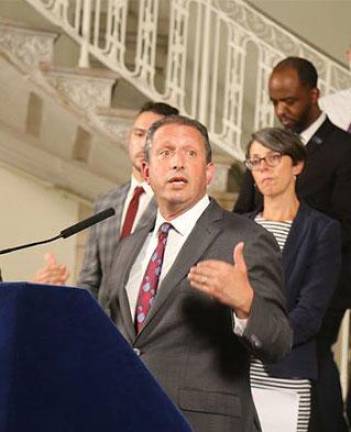Adams’s Emergency Powers for Asylum Seeker Contracts Revoked by Lander
The revocation comes on the heels of NYC City Comptroller Brad Lander releasing a “deep-dive” report on emergency procurement, with 80 percent of new procurement dollars going towards “asylum seeker services.” Adams complained that the decision would end up “tying our hands behind our back.” Lander’s report had concluded that applications were notably delayed, with contracts being awarded to outfits–such as DocGo–with little experience.

The Adams administration may no long utilize emergency powers to award contracts for “asylum seeker services,” after City Comptroller Brad Lander reportedly revoked the privilege. They’ll now have to obtain individually audited approvals from the Comptroller’s office.
After the news broke on December 4, Lander’s spokeswoman Chloe Chik pointed to a “deep dive” report on emergency procurement that the comptroller issued on Nov. 30.
The revocation was handed down in a letter sent that same day to relevant agency heads. The letter notified them that “the comptroller’s office citywide prior approval is hereby revoked,” according to a copy initially obtained by The Daily News.
Chik noted that the report had discovered “extensive failures to report subcontractors despite problems that surfaced with many of them.” In response, she added, Lander’s office had “concluded that the most prudent course the city’s fiscal health and integrity would be to require City Hall to seek prior approval before using emergency procurement on a case-by-case basis.”
Overall, 80 percent of new procurement dollars between January 2022 and September 30, 2023 (the period covered by the report) went to asylum seeker services.
Specifically, the report concluded that relevant agencies “submitted only 27 percent of asylum seeker-related written determinations [to the Comptroller’s office and Law Department] within 15 days,” with the rest coming later. A written determination is defined as a “formal outline” for the “basis of the emergency and vendor selection,” and is therefore closely tied into contract oversight. They are, as aforementioned, expected within 15 days.
The report determined that written determinations violating the 15-day rule wasn’t limited to asylum seeker services contracts. Indeed, 73 percent of all written determinations–including from agencies such as the Department of Housing Preservation & Development (HPD) and the Department of Health & Mental Hygiene (DOHMH)–were reportedly late.
Furthermore, “emergency contract packages” are expected to be submitted to oversight agencies within 30 days. Seventy-three percent of those related to asylum seeker services were late.
One such late offender was the infamous contract for $432 million to DocGo., Inc., which submitted their contract package three months late. The City Comptroller revoked DocGo’s emergency contract with the HPD, on September 5. According to the report, they did so after becoming aware of the “the vendor’s lack of experience in providing temporary housing and support services and the agency’s process for selecting this vendor for the award.” This was all reportedly unveiled after the Comptroller received the late contract package.
“When New York City faces an emergency, agencies must manage unexpected circumstances as nimbly and efficiently as they can. However, agencies navigating emergency procurements should not defer reporting deadlines and must adhere to guidance around transparency, accountability, and greater cost efficiency when stewarding city dollars,” Brad Lander pronounced in the report.
“Otherwise, unscrupulous vendors could take advantage of the situation, supplies could go to waste, and the public could lose its trust in government to act responsively and responsibly in times of crisis,” he clarified.
He found support from City Council Speaker Adrienne Adams, who said that NYC “must move away from emergency contracts, especially with for-profit companies that are inherently expensive, and instead shift to non-profit organizations with a greater expertise and commitment to providing services in the long-term public interest of our city.”
Needless to say, the Adams administration was unhappy about Lander’s decision to revoke his emergency powers, setting up further conflict with the Comptroller’s office and the City Council Speaker.
“Thousands of new migrants are still coming to New York City every week—and the comptroller tying our hands behind our back is unfair to both new arrivals and longtime New Yorkers and will unquestionably slow down every step in the process,” Adam’s spokesman Charles Kretchmer Lutvak said.
So far, 146,000 asylum-seeking migrants have arrived in NYC since the spring of 2022, with 66,300 of those staying in homeless shelters as of late November. Mayor Adams has instituted a 30-day limit for single adult asylum seekers in shelters, after which point they get booted out and must reapply for a new bed. This recently led to hundreds of applicants waiting for hours outside, in bitterly cold temperatures, at the (former) St. Brigid’s School in the East Village. That location was selected as the city’s designated “reticketing” center for all five boroughs.